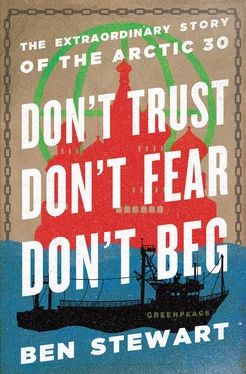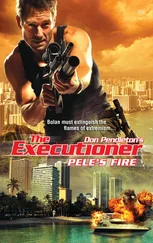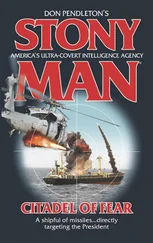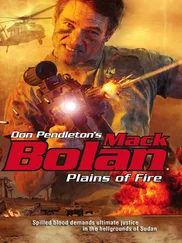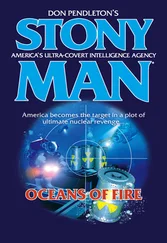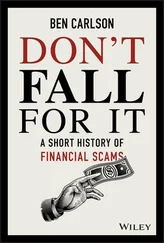‘ Izvinite ,’ she mumbles. ‘Sorry.’
‘ Ne kurit .’ – ‘No smoking.’
Mona holds up an apologetic hand and walks out of the courtroom, whistling to herself and shaking Phil’s matchbox.
Phil’s appeal is rejected and he’s taken from the court in an avtozak . Kieron is with him, he’s just had his appeal rejected as well. For both of them the trip to court was pointless, apart from the matchbox. That camera card was sitting in Phil’s boot for weeks and now, finally, he’s got it out of jail. But he’s worried he was spotted. If someone finds that matchbox on Mona, they’ll both be in a whole lot of bother.
‘Hey, Phil.’
He turns to Kieron. ‘Yeah?’
‘I think I’m gonna propose to Nancy. If I get a phone call, I mean. I think I’m gonna ask her to marry me.’
‘You’re gonna propose?’
‘Yeah.’
‘To your girlfriend?’
‘Jesus, Phil. Of course to my girlfriend. Who else?’
Silence. Phil sniffs. He doesn’t want to say it, but he thinks it’s a bad idea. He thinks Kieron should wait until he gets out of jail. If you do it over the telephone then Nancy can’t say no, he thinks. You can’t say no to someone who’s in jail, so even if it goes well and you hear the right thing back, then later you’ll have to deal with the paranoia. Turma racing. You’re going to start thinking she only said yes because she didn’t dare say no. So then the paranoia’s going to build in your head, going round and round, and even though you’re engaged you’ll start thinking she’s going to find a quiet moment to say, ‘You know what, I’ve had second thoughts.’
But Phil doesn’t say any of this to Kieron. His friend looks so happy just thinking about asking Nancy to marry him. So Phil nods and says, ‘Yeah nice one. I mean, absence makes the heart grow fonder.’ And that’s the end of the conversation.
That afternoon Mona hands the camera card to Fabien Rondal. He uploads the footage onto a file-hosting site then he calls Mads Christensen on what he hopes is a secure line and tells him where to find it. The Danish campaign chief downloads the file, Rondal wipes it at his end and destroys the memory card. The campaign now has the footage for the hearing before the international court. Operation Extraction is complete. Mona strikes a match and lights a cigarette.
Day after day the Sunrise crew are taken to the courthouse to be told they must stay in jail. For Denis the experience of standing before the world’s media in a cage in a Russian courtroom is weighted with irony. Until recently it was him wielding the camera, taking some of the most widely published photographs at the big political prosecutions. He recognises a lot of the journalists, some of them wave at him. He’s surprised to see a friend from Time magazine there, but it’s just more proof that his case is huge abroad.
On the second Friday of the hearings, it’s Alex’s turn. She’s wearing her purple ski jacket and glasses, and as the verdict is translated she brings her hand up to her face to cover her mouth as her eyes fill with tears. Her father Cliff is watching live via the Internet. ‘And that was the worst moment for us, when she was denied bail and she broke down a bit. That upset me. We couldn’t believe what was happening. It was shock. Emotional shock.’
At Sini’s appeal she holds up a small white postcard, on which she has written the words, ‘THANK YOU FOR ALL THE SUPPORT’. She signs it with a heart. That evening she sits on her bunk and writes a letter to Fabien Rondal’s ground team.
SIZO-1, cell 217
The court hearing was just like a theatre play where everyone (except me) followed the already set and decided manuscript. The question that has been bothering me the whole time of our arrest and all the investigations is that no one has been asking why I did it.
Climate change is the biggest and at the same time the most denied threat the world as we know is facing. And the dirty oil companies are taking advantage of the effects of climate change that are already visible… The oil companies are let to do whatever they want in the Arctic, that is said to belong only to some of the nations, but that actually is all ours since our future depends on it… There is no time to wait for international climate negotiations that practically lead nowhere… The oil companies are going to Arctic now and they are threatening the future of the Arctic, the climate and coming generations now, as I sit in this bloody prison.
I go and fight for the Arctic because I see no other possibility in the current situation. And as a person being from the Arctic I see that that is where my responsibility for the climate battle is.
I do not regret what I did. And if we went back in time, knowing about what our action would lead into, I would still do the same again.
Climate change is the one that doesn’t forgive. And Arctic is what we cannot get back if we lose it. Justice comes and goes, freedom is there always if you just decide so.
Sini.
The appeals go on, the process grinds forward, always with a sense of impending, inevitable rejection. But the Kremlin does not only have the thirty in its sights.
Mads Christensen has sources telling him an FSB raid on the Greenpeace office in Moscow is a real possibility. Bank accounts will be shut down. Staff will be arrested and charged with complicity in the action. Any doubts about the veracity of the information fall away when the rental contract on the Russian office is cancelled with just three weeks’ notice. It’s a typical tactic familiar to Russian opposition groups. A decision is taken to start pulling out the foreign staff in Russia, even Daniel Simons, who’s leading the legal response team in Murmansk.
In Moscow, on the balcony outside the Dance Hall, the head of Greenpeace Russia, Sergey Tsyplenkov, tells Laura Kenyon – a Canadian campaigner – what the sources are saying. The Investigative Committee is compiling a list of people it will potentially be investigating, and he assumes her name is on it. It’s too risky for her to stay here. As a foreigner she’s exposed. It’s time to go.
Simons and Kenyon leave Russia. Everybody else waits for the Kremlin to make its move.
The following day nothing happens, but rumours of an assault on the Moscow office are swirling like confetti. Now sources inside the Russian government are warning that the crackdown is imminent, that the office will soon be shut down and staff arrested. Instead of bringing this saga to a close, it seems there is an appetite in the Kremlin to escalate.
Late in the afternoon Mads Christensen taps the microphone on the video link between London and Copenhagen. He asks Ben Ayliffe and the head of the media team to get on a secure line.
‘Look,’ he says, ‘we’ve got a source, a really good one, someone who knows what’s happening at the top level. I don’t want to say who this is, and you don’t need to know, but they’re telling us it’s going to happen. Maybe as soon as tomorrow. Office shut down, bank account closed, staff picked up by the FSB. We need to do something. Something that makes them stop and think. We need to make some kind of intervention so the PR hit they think they’ll take – inside and outside Russia – makes the FSB think again.’
Ben Ayliffe and his colleague lock themselves in a room with a bag of pastries and a pot of coffee and thrash through ideas. Ayliffe leads the team organising demonstrations, vigils and petitions around the world. He’s a twelve-year Greenpeace veteran with a passion for cricket, bird watching and shutting down polluting infrastructure using peaceful direct action. It should have been him on that ship but he hurt his back and Dima took his place.
Читать дальше
